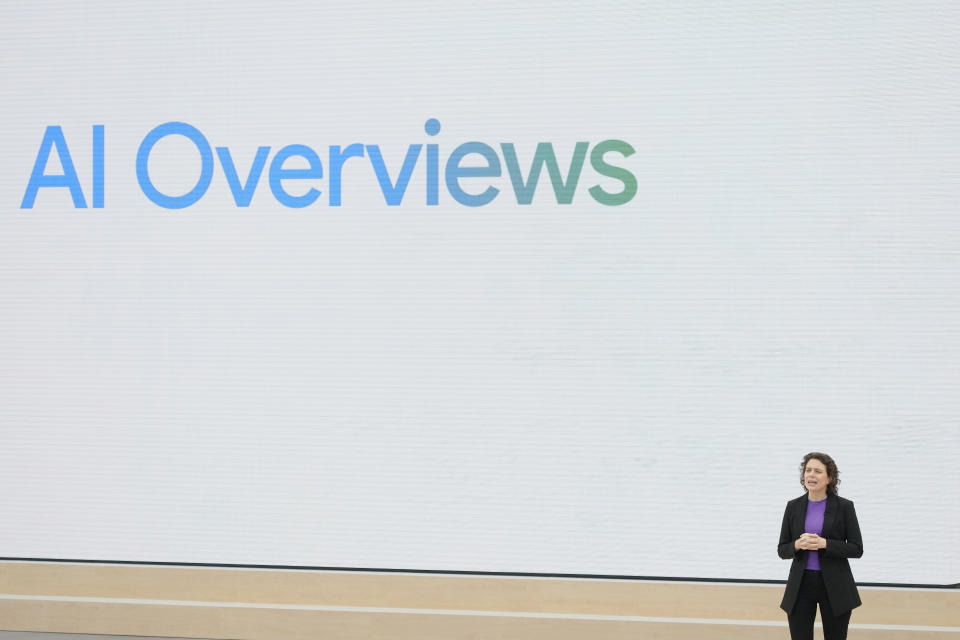What happens when heavy AI spending meets slowing ad growth? The market answered with unforgiving sentiment, sending shares of Google’s (GOOG, GOOGL) parent company Alphabet down 7% since its earnings report Tuesday as the resources being poured into AI infrastructure became a reason to pull back alongside perceived weakness in the core business.
The market’s initial reaction to the company’s second quarter highlighted a post-pandemic, high-interest-rate dynamic familiar to the tech giants: Great is no longer good enough. A mixed bag of results won’t cut it for many investors, especially as chatter around AI fosters a hair-trigger temperament.
That’s as true for Google as it is for Tesla (TSLA), another Magnificent Seven member that investors are walloping this week. Similar to the search giant, Tesla’s weaker-than-expected results stem from the heart of its business, helping to explain the sliding stock price. The EV leader reported mixed results, revealing notably lower growth this year and sagging profits stemming from cooling vehicle demand and increased competition.
Both reports show that the leeway given to companies pursuing unproven AI business lines only goes so far. Wall Street’s leash gets a lot shorter when the main business is under pressure. Amazon (AMZN), Meta (META), and Microsoft (MSFT) earnings will serve as the next test of investor tolerance for AI spending when the companies report next week.
Google’s advertising revenue topped $64.6 billion versus analysts’ expectations of $64.5 billion, up from $58.1 billion last year. But the miss came from YouTube, where ad revenue fell short. The segment generated $8.66 billion versus expectations of $8.95 billion.
Wall Street has been paying close attention to how Big Tech names are following through on their AI initiatives. But that can be a double-edged sword for the stocks.
The prospect of a paradigm-shifting technology has ramped up expectations of future profits. But any setback serves as a damaging blow to the AI boom as concerns over expensive infrastructure take hold.
Tech leaders have tried to address these fears head-on.
On the company’s earnings call Tuesday, Alphabet CEO Sundar Pichai said, “The risk of under-investing is dramatically greater than the risk of over-investing for us here.” In his view, spending too much on capital expenditures is a small price to pay for claiming a top spot in an AI-dominated landscape in the years ahead.
Meanwhile, Tesla CEO Elon Musk has doubled down on the company’s AI-driven prospects, particularly when it comes to self-driving cars. When asked on the company’s conference call Tuesday how the potential for fewer electric vehicle tax credits could impact Tesla’s business, Musk responded that “the value of Tesla overwhelmingly is autonomy.” He added that anyone who doesn’t believe the company will solve vehicle autonomy should “sell their Tesla stock.”
Tesla shares recovered somewhat Thursday but are still down 11% for the week. Google’s shares dropped another 2% in morning trading.
Some analyst reactions suggest the market pullback is overblown, more of a short-term blip, even as they acknowledge sliding growth.
“We come away optimistic about digital ad trends (Search and YouTube) and new AI solutions across its ad platforms while acknowledging tougher comps will yield decelerating growth,” said Angelo Zino, senior equity analyst at CFRA Research, in a note on Wednesday.
Other observers looked past the more challenging aspects of the report and focused instead on the broad AI picture. “Strong 2Q search and Cloud results reinforces our thesis that Google is a net Al beneficiary,” said analysts at Bank of America Global Research in a report Wednesday.
The question of higher AI expenses will likely continue to pester tech companies, especially as observers prod how those investments are being put to work and when investors can expect a return. For Google, in particular, any dents in the advertising business make absorbing massive AI expenditures more painful.
Commentary from Google leaders also suggested next quarter’s YouTube figures will show even more constrained growth. And with AI spending here to stay, investors may find themselves in the same predicament.
Hamza Shaban is a reporter for Yahoo Finance covering markets and the economy. Follow Hamza on X @hshaban.
Click here for the latest technology news that will impact the stock market
Read the latest financial and business news from Yahoo Finance
EMEA Tribune is not involved in this news article, it is taken from our partners and or from the News Agencies. Copyright and Credit go to the News Agencies, email news@emeatribune.com Follow our WhatsApp verified Channel





